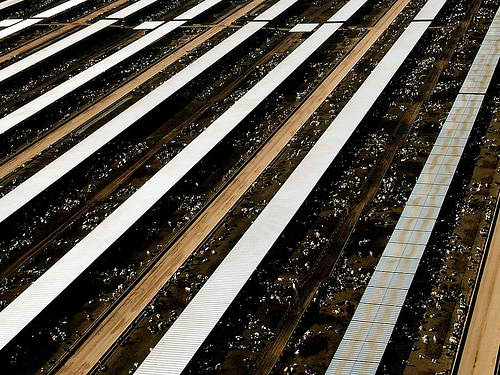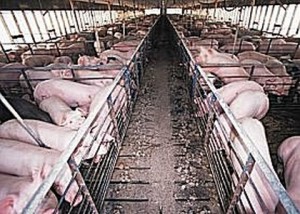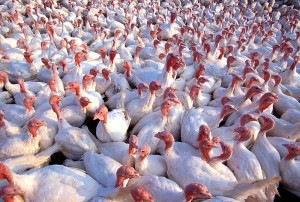 You know things are bad in the US industrial food system when Russia seems to know more about it than American citizens do.
You know things are bad in the US industrial food system when Russia seems to know more about it than American citizens do.
Last week, Russia announced that it intends to ban US imports of beef and pork unless these foods can be certified free of the livestock drug ractopamine.
Racto-WHAT-amine?
Yeah, that’s what I thought when I first learned about Russia’s recent move.
Ractopamine was approved for use in pigs in 1999, cattle in 2003 and turkeys in 2009 – all largely unbeknownst to the public.
Ractopamine is a growth promoting drug which increases muscle mass by actively slowing protein degradation. Unlike other veterinary drugs which are withdrawn prior to slaughter, ractopamine is started and never withdrawn in the animal’s final days. It is given to beef cattle during their last 4-6 weeks, pigs in their last 4 weeks, and turkeys for their last 1-2 weeks.
Given that these animals are actively being given ractopamine immediately prior to slaughter and have been receiving the drug for some weeks preceding, there can be no doubt that a residue of the drug remains in the animal’s meat when it finally hits supermarket shelves.
 Ok, so there’s some ractopamine left in the conventional meat of the 45% of pigs, 30% of feedlot cattle and an unknown number of turkeys.
Ok, so there’s some ractopamine left in the conventional meat of the 45% of pigs, 30% of feedlot cattle and an unknown number of turkeys.
What’s so bad about this drug anyway?
The Bureau of Veterinary Drugs, Health Protection Branch of the Health and Welfare Department of Ottawa Canada found that rats fed ractopamine experienced a cluster of birth defects such as cleft palate, open eyelids, shortened limbs, missing digits, enlarged heart, and protruding tongue.
In 2002, the FDA accused Elanco, a subsidiary of Eli Lilly and manufacturer of Paylean, the brand name for ractopamine for pigs, of a cover-up on the dangers of the drug in animals. There was no mention in Elanco’s documents submitted during Paylean’s approval process of numerous phone calls from farmers reporting that their animals vomited after consuming feed containing Paylean or that they had become hyperactive, overly stressed (“down and shaking”), or had died as a result of exposure to the drug.
Inexplicably, the FDA went on to approve ractopamine for cattle the following year even after it’s 14 page warning letter to Elanco on it’s blatant deception and abuse of the approval process of Paylean for pigs!
 Even though the FDA rolled over on ractopamine, other countries paid attention to the scandal with the growth enhancing drug banned in Europe, Taiwan and China where an estimated 1,700 people were “poisoned” from eating Paylean-fed pigs.
Even though the FDA rolled over on ractopamine, other countries paid attention to the scandal with the growth enhancing drug banned in Europe, Taiwan and China where an estimated 1,700 people were “poisoned” from eating Paylean-fed pigs.
Now, with ractopamine already banned in Europe, Russia is taking the additional step of banning US meat imports unless they can be certified ractopamine-free. While US meat producers are furious at the move, I applaud Russia for taking steps to protect its people from the ravages of exposure to this veterinary drug.
Parents of children beware. There is no doubt that ractopamine residue will eventually be linked to fast growth aka obesity in children and even perhaps hyperactivity as it has been in animals. Don’t wait for that day! Protect your children now!
Opt out of conventional supermarket meats that have a high chance of containing residue of this dangerous drug. Purchase clean, pastured meats for your family and buy locally and in bulk to get prices that are reasonable and fit within your household budget.
Sarah, The Healthy Home Economist
Sources: Who Says It’s Not Safe? US Cattle and Hog Producers Furious Over Russia Meat Ban
“Not Safe for Humans” Drug Being Fed to Livestock








I need to call US Wellness Meats which is where I’ve been getting most of my beef.
Really….. It is time for change in our food system!!
WTF? Seriously.
Ditto what Elyssa said. Where else can we buy meat? Also, I didn’t see anything about chicken in the article so I assume they don’t feed it to chickens?
Renee, you can search for local farms in your area on localharvest.org, or eatwild.com.
You can find grass-fed beef online as well. Ask around to find a trusted source, or just put it on this forum…most helpful like-minded people on here!
ewww!!!
Wow!
We’ve been buying grass fed beef from a local farm the last couple years and just found a place to buy chicken!!
Nice. 😛
In the first picture under the title of this article, is it of a feed lot? I tried to expand it so that I could focus on it better, but it doesn’t magnify with a point and click of my mouse.
For anyone who lives near Greenville, Florida I would highly recommend buying your meat at Deep Roots Meat. We have toured the farm and talked with the farmer. Mr. Platt is a fifth generation farmer, who is following the same great farming practices that are preached by Joel Salatin. His farm is very clean and his cattle are healthy and happy and they’re only grass (forage) fed. And to top it off, the meat is processed in a nearby facility that is 100% devoted to Deep Roots Meats so there is no possibility of cross contamination or of dishonest swapping of meat sources.
After a couple of years of not buying meat it is exciting to be able to buy meat again to put on my family’s table. And this meat is sooooo good!
Go to the following web site: http://www.deeprootsmeat.com to find out more about the farm. While you are there you’ll find an interesting article about dung beetles. God’s design in creation is such a wonder!
Vivian Maddox
Yes, that first picture is a huge, disgusting feedlot. You can smell them 5 miles away (I’m not joking). I experienced the nauseating smell firsthand when I was out in Nebraska a few years back and spent time driving through the country. They hide these facilities far far away from where anyone lives to cover their evil deeds.
No, you aren’t joking, and no you can’t smell them 5 miles away.
What do you think comes out of the back end of animals? Roses?
Where will all the grass come from to feed these naturally raised grass fed animals, and how much of the world will starve before that happens?
You have a choice where you buy the meat you eat, and it is good to be cautious, but there are a lot of good people out there in production agriculture too, and you are slapping the evil tag on them just because you “spent time driving in the Nebraska countryside”. Nobody is hiding anything. There has to be land to build those barns on, and it typically isn’t at the city limits.
Please exercise your freedom of choice. Its good you have it. Do you really think the American Farmer is doing anything they really feel like will hurt the general public?
Jim, I understand the state of Colorado has a law not allowing feedlots to be photographed. Whether that is true or not I am not completely sure. But let’s say it is true for conversation sake. Would that change your opinion that they aren’t trying to hide anything? On a side note, can anyone confirm this law? I think I saw it in the documentary, Food Inc. but I can’t remember.
Eddie,
I don’t know that law and couldn’t confirm from a quick search. I am in Colorado often so I could find out quickly. I believe some of that came about after 9/11/01. There was a lot of concern about people filming and photographing feedlots (I live near many, many of them in my county). Much of this centered around people with out of state plates, just sitting and photographing. The country was concerned at the time with the thought of terrorist type attacks against our food supply, which could happen via feedlot or grassfed really. All animals have to drink. Again, I don’t know if this is why the law is enacted or not.
However, I can tell you this. I work in the ag. industry and I am proud of it. I am not in animal production rather crops. I have been on many feedlots over my time. I have never seen anything that has alarmed me, but I am not around the injections and doctoring that takes place, so I cannot speak to that.
I understand that this is big business today. There is a growing world population, and many more desire protein in their diet. I really don’t know how else we are going to provide it to them. Really we all want to provide it as safely as possible.
I agree that we don’t know the long term effects of any drug (whether human applied or animal) so I am conflicted.
I’m not sure I ever really answered your question to me. If the law was enacted after 2001 in reaction to the terror attack in New York City, then no, I’m not skeptical. If it has been much more recent, then I would wonder why. If it was done within the last year then maybe moreso. I don’t believe that any questionable activity being done would be done in the open though. And to get those photos would be trespassing and they wouldn’t need a separate law to enforce that one.
If that land and feedlot are privately held, they do have a right to some privacy, much like you do in your home. I really don’t believe they are trying to do any harm.
That’s a good observation Jim about 9/11 and tampering with the food supply. Seems like the pics that were being taken in the documentary were from the public street and they reported that news reporting agencies had been sued for posting the pics they took of the facility. It’s been a while since I saw the film but that’s what I recall. So perhaps the reason for the law was because of your stated reason, but it seems like it’s being enforced for other reasons so that certain images or info doesn’t get to the public. At least that was how the case was made and I remember it having pretty good logic. But I will submit that you could be right. I am also a firm believer that a lot of what came out of 9/11 was sold as being for that reason but was really to “control” something totally unrelated. This may be the case of that as well. Thanks for discussing it though.
Eddie,
I don’t disagree that everything is political. That is also why I’m taking this with a grain of salt. We are in a widespread, devastating drought. There is much less grass in the heartland to feed our cattle on right now. We have no choice but to feed them grain and hay. Rate of gain is so high right now, I don’t know how this drug could push it higher, but again, I’m not a cattle guy.
Back to the drought. Combine this, with low carry out on grains multiply that with a growing world population, and boom you have high prices. Since I’m suspicious anyway, it would seem to me that this could just as much be a bargaining point for Russia to devalue the product as much as anything. Don’t take that I’m saying this isn’t potentially harmful in the long term, but if you have to buy food for your country you are going to try to find advantages I would think. Again just my own thoughts.
I may come off as a homer for production agriculture, and so be it, but I have enjoyed our discussion.
Jill, those cows were raised on grass, except the last few weeks of their lives.
Meant to type Jim, not jill. Sorry.
your comments are ignorant they are hiding what they do, yes the american people are ignorant to, but if many people knew what they were doing they would not eat the meat. facts we don’t need to eat eat as much meat in this country as we do., every county and city could have their own local agri bussiness, where the meat produced is clean and healthy.. most of the farms that are doing this crap is run by corporations..not your family farmer.
Vivian,
Actually, it looks like a dairy operation. Most feedlots aren’t for holsteins (black and white milk cows) as they are not bred for beef consuption. They appear to be holsteins…and I grew up on a dairy farm. I live “far, far away from where anyone lives” and there are a couple feedlots around here (Nebraska). The feedlots require a lot of space, so it’s better to put them out here. Also, they are closer to the small producers, which is where they get their supplies.
Sarah,
Is it true that Russia called for this ban only after our Senate imposed trade sanctions on them for human rights violations? (Rueters)
Roberta, does it really matter if it’s ‘tit-for-tat’ in relation to Russia calling for the ban after the US Senate imposed trade sanctions on them (if that’s true)? The fact is that the drug has been banned in Europe, Taiwan and China. Isn’t that enough of a reason to be concerned and/or to investigate?
Diana,
I’m sorry, I didn’t mean to imply that it wasn’t something to be concerned about and to find out more information about. I had just read that a lot of analysts believed that was the reason the ban was enacted: our Senate slapped their political hand about human rights violations and so to get back, they hit us financially. I was just attempting to ask Sarah, or anyone else, for that matter, if she knew if there was any truth to that. In answer to your first question, yes, if there is any truth in this, then their motives are not purely for health reasons and their ban should be taken with a grain of salt.
Again, I’m NOT saying there’s not reason for concern. I have also read about the bans on the drug in Europe, Taiwan and China. However, do they currently have a ban on all US beef imports, too? If not, why have these other major importers of US beef not responded the way Russia did? Rueters also reported that in August of this year, the Tawainese (sp?) legislature approved certain levels of the drug in beef imports.
Because tone of voice can not be clearly communicated in writing, let me emphasize that I am NOT attacking Sarah or anyone else’s opinions. After I read Sarah’s article, I had concerns. I did a little research on the topic. My “little research” created more questions, some of which I’ve posted in the hopes that others have found credible sources with some answers.
I am a stay-at-home mom and my husband can support us largely due to the beef producers in our area. When one of the top 10 importers of US beef imposes a ban, yes, the big feed lots are financially hit and they have to scale back, but the ones who really take a hit are the small family operations in our county who no longer have a market to sell their animals.
Again, I’m not saying that there shouldn’t be some concern here. I’m not saying you should poison your children just so I can be a stay-at-home mom (okay that was a bit inflamitory 🙂
Also, I should say that I can’t speak to the pork and poultry industries as I have almost no knowledge of how they work.
That’s the only place I buy beef from. It’s fantastic meat and we’ve know the platts forever since a lot of the family grew up where I live. So worth the extra money we spend and so good to know we’re getting CLEAN food!